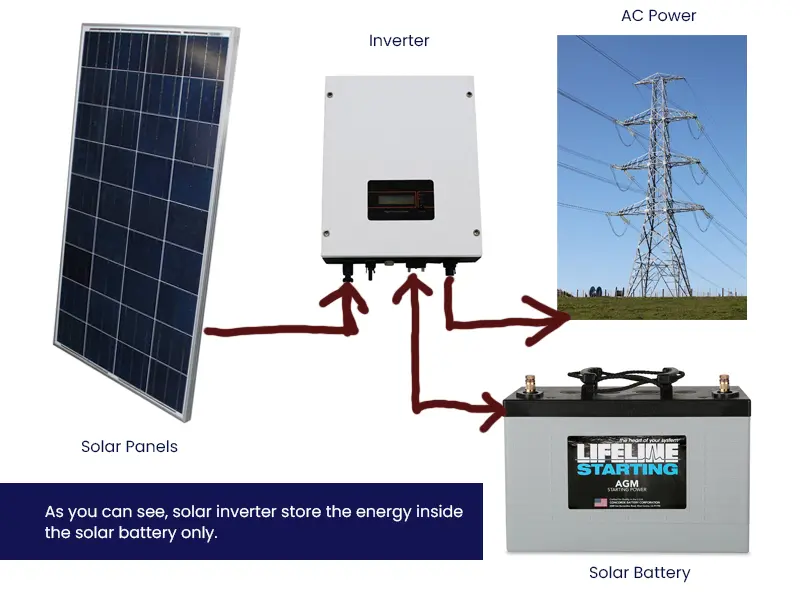One of the most common misconceptions about solar inverters is that they store energy or power.
Many people think that the solar inverter works for storing power for later use when the sun is gone.
But do solar inverters store power? If not, then what is its main function? Let’s find out!
In this article, we will reveal whether the solar inverter stores power or not and its main function.
Do solar inverters store power?
No, the solar inverter does not store any power or energy. It draws its power from a storage battery and converts it to AC power.

Simply, it cannot store any power or energy. It has only the ability to convert one type of electrical power to another.
When I install different solar systems for houses in the USA and Sri Lanka, sometimes, I did see Chinese-branded solar inverters which have an internal battery as well.
These solar inverters were not large ones. Mostly 1Kw solar inverters with 60 to 100 Ah batteries inside them. The physical size is large to make space for air circulation inside the system.
These types of inverters were really rare. In my Professional experiences, I can say these are not good for the long term and safety-wise. it’s always better to have the inverter and battery bank separated.
What is the alternative way to store power inside an inverter?
UPS (uninterrupted power supply) is a type of device that store energy.
Well, if we look into the operation, inside a UPS, there is a battery and a separate inverter too. So, the inverter takes the power from a battery and converts it to AC power. 120 AC or 240 AC under 40 to 60 Hz.
The Charging process is different in UPS devices. They use the main power grid as the charging source, unlike solar.
Usually, we use UPS as a backup power source for our laptops and computer servers. 1kw-rated UPS is enough for a desktop PC or laptop to run for one hour period.
With higher Kw values, you can get higher backup time for your electric devices.
Why do you need an inverter for solar panels?
The main function of the inverters is to convert the direct current (DC) to alternating current (AC). But now, a question that might strike your mind is, why convert the DC power to AC?
This is because modern electrical appliances depend on and work on AC power or electricity. But solar panels produce electricity as DC power.
So, the electrical power produced by solar panels cannot be directly used to run most modern household appliances.
To transform the solar power source into a power source that is usable and adaptable for home and office electrical appliances, solar inverters are used to convert the AC power from the solar panel to DC to serve the home appliances.
Thus, for this reason, if you are using solar panels as the electrical power source of your house, it is required to use solar inverters along with them to make them usable.
What does a solar inverter do?
Solar inverters are an essential component of a solar power system.
Their main function is to convert the direct current (DC) generated by solar panels into alternating current (AC), which is used to power household appliances and electronics.
The solar inverter does not store any power or energy, but it draws power from a storage battery source when it is not in use.
In DC power, the electricity flows in a single direction, with a constant voltage.
In contrast, AC power flows in both circuit directions, as the voltage changes from positive to negative. The solar inverter regulates the flow of electrical power that the solar panel produces, switching the direction of the DC input back and forth to convert it into AC power.
This AC power can then be used to power modern electrical appliances that depend on and work on AC power.
There are different types of solar inverters, including on-grid solar inverters without battery storage, off-grid solar inverters with battery storage, and hybrid solar inverters that combine both types.
Hybrid solar inverters are an all-in-one solution that integrates solar and battery technology, allowing for both load-shifting and self-use of energy.
However, they are more complicated to set up and more expensive than other types of solar inverters.
Can you store solar power without a battery?
If you are not looking forward to getting a hybrid solar inverter, but instead want an option where you will not have to use any battery to store the solar energy, then Grid Inter-Tie can be a good option.
This system is achieved by net-metering. Through net metering, the surplus produced solar energy from the solar panel is transferred to the grid, and then, your electric meter rolls backward. And then, during the nighttime, when the system does not generate electricity, the electricity from the grid can be pulled, and the electric meter rolls forward.
This is how the grid can be used to store the generated solar electricity.
Final Words
So, now you know what the main function of the solar inverter is. And it should be crystal clear to you by now that solar inverters do not store power. However, it would help if you always remembered that for using a solar panel to run modern household appliances, a solar inverter is a must.
Otherwise, it will not work on your electronics and appliances. I hope I was able to help you clear out your confusion about the real function of the solar inverter.
Thanks for reading till the end!

Eng. Matthew Joseph Nandirio is the Founder of walkingsolar.
After graduating from the University of Houston in 2002, matt started working as a Solar Electrical Engineer for several multi-national solar energy companies.
He has a wide range of experiences including solar system requirement analysis, planning, maintaining, debugging and even solar device development through research.
He now shares his 20 years of expertise through his articles on the walkingsolar website.
Further, he is also the author of two books on Solar Technology, “Solar Power for Villages” and “DIY Solar System for Dummies”.
